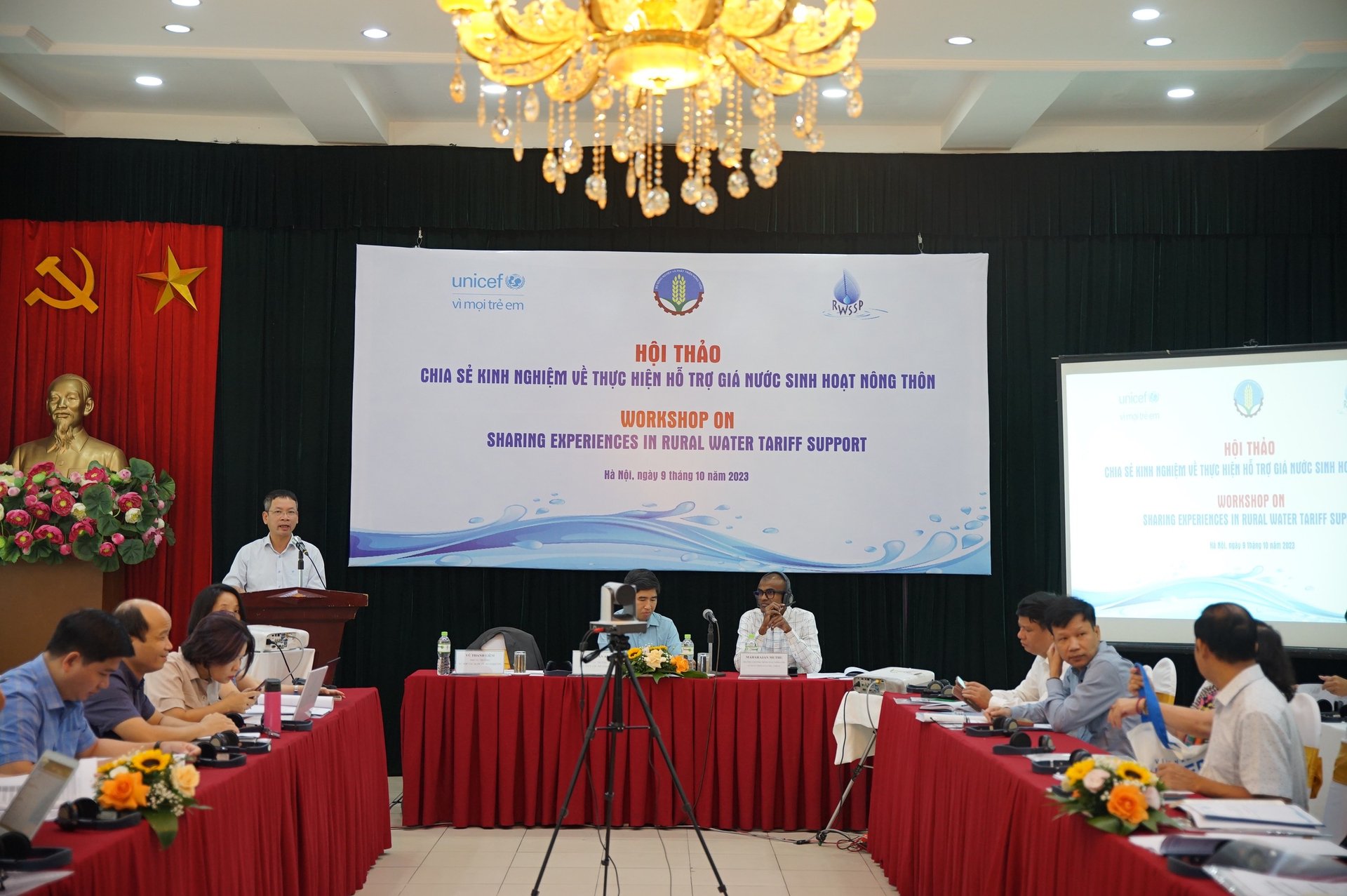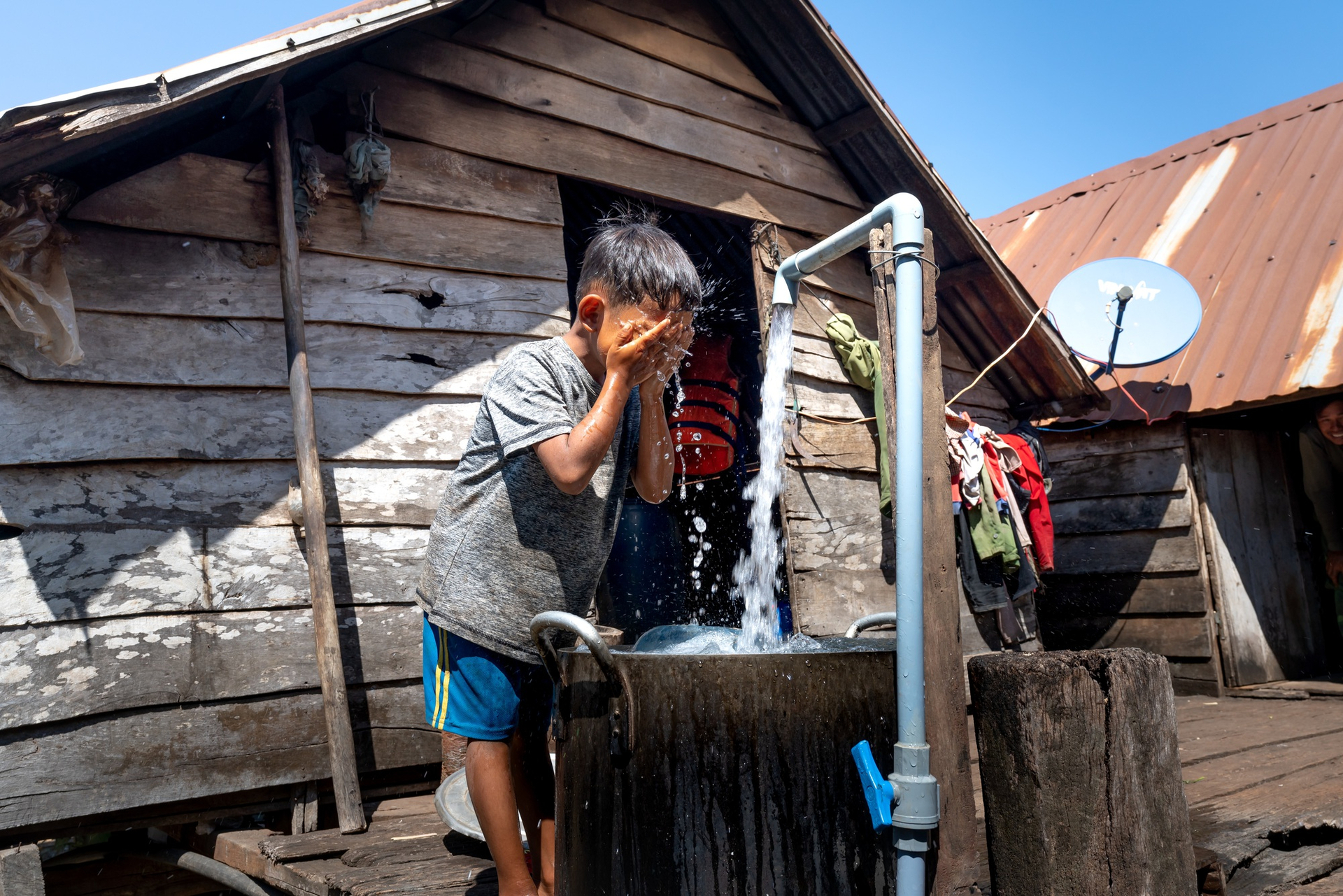May 21, 2025 | 06:01 GMT +7
May 21, 2025 | 06:01 GMT +7
Hotline: 0913.378.918
May 21, 2025 | 06:01 GMT +7
Hotline: 0913.378.918

On October 9, ICD in collaboration with the Department of Water Resources (MARD) and UNICEF organized a Workshop on Sharing experiences in rural water tariff support.
The objective of the Workshop on Sharing Experiences in Rural Water Tariff Support is to provide an overview of the current state of policies regarding water prices, compensation, and support for rural clean water prices at the central level, as well as lessons learned from the implementation of these policies in the central provinces.
According to the National Water Supply Strategy outlined in Decision No. 1978/QD-TTg dated November 24, 2021, 65% of the population will use standard clean water with at least 60 liters/person/day by 2030; 100% of households, schools, and medical stations will have toilets that meet usage standards; 100% of people will practice personal hygiene; 25% of concentrated rural residential areas will have a domestic wastewater collecting system with 15% of domestic waste collected; and 100% of people will practice personal hygiene. However, achieving this objective is difficult due to the deteriorating infrastructure and declining water supply capacity caused by insufficient revenue to fund expenditures, particularly maintenance costs.
In actuality, the price of collected clean water cannot completely compensate for operating management and depreciation costs... whereas devising and submitting for approval a target-based price plan can help utilities mitigate expenses. Due to numerous obstacles and issues, progress on the project is extremely sluggish.
According to Mr. Vu Thanh Liem, Deputy Director of the International Cooperation Department - Rural Water Supply and Sanitation Coordination Office (Ministry of Agriculture and Rural Development), the expense of pure water consumption is a major factor. Determines the efficacy and sustainability of the project, but the water prices that are presently being applied vary greatly, as do the price levels and cost structures between projects and models. operating management organization, even within the same geographic region.
By 2045, 100% of the population will have access to water. By 2030, 65% of the rural population will have access to pure water of standard quality (minimum 60 liters/person/day). The issue of water prices, price compensation, and price support is being discussed, and synchronous solutions are required at all levels, according to Mr. Liem.
Dr. Dinh Van Dao, from the Vietnam Institute of Water Resources, shared information regarding the construction of water prices, price compensation, and support for rural domestic water prices. He noted that although encouraging results have been achieved, pure water for rural areas still faces numerous obstacles and challenges. There are still significant disparities in water supply and sanitation rates between regions, localities, districts, and communes within a province; the administration and provision of public services on rural clean water in the area are still unstable and ineffective.
Vietnam has more than 18,000 rural water supply pipeline projects, which provide clean water services to over 51% of the country's rural population, leaving approximately 30 million people without access to clean water. This means that the dearth of pure water services poses significant obstacles to the well-being and growth of many rural communities. However, more than 41% of these projects are inactive and non-sustainable, whereas 26% are relatively sustainable.
Dr. Dinh Van Dao also brought up a number of challenges in the context of building water prices and compensating domestic water prices in rural areas, such as deteriorating water supply infrastructure and a decrease in water supply capacity as a result of revenue not covering expenditures, particularly maintenance costs. The reason is that it is nearly impossible for the price of collected pure water to completely compensate for operating management costs and capital depreciation... while developing and submitting for approval a target price plan that can offset construction costs is proceeding at very slowly.
The price of clean water consumption is the key factor that determines the effectiveness and sustainability of the project, but the applied water price is different, there is a large difference in price level and cost structure between projects, organizational and operational management model in the same locality.
According to the representative of the Vietnam Institute of Irrigation Sciences, to achieve the goal greater than or equal to the cost, the issue of water price, price compensation and price support requires synchronous solutions at all levels.

It is crucial for governments to establish supportive policies that prioritize the needs of rural communities and provide a conducive environment for sustainable and equitable water tariff implementation.
Mr. Maharajan Muthu, Head of the Development Program for Children's Survival - United Nations Children's Fund (UNICEF) Vietnam, said that establishing appropriate water prices plays an important role to ensure rural communities have equitable and sustainable access to water resources.
Mr. Muthu called on all parties to coordinate to find sustainable solutions to address the challenges posed.
During UNICEF's activities, with many rural clean water projects, representatives wanted to highlight important factors and recommend that Vietnam consider implementing the water tariff system effectively.
First and foremost, it is essential to recognize the diverse socio-economic conditions of rural communities. Factors such as low population density, limited infrastructure, and economic constraints necessitate careful consideration of the affordability and accessibility of water services when designing water tariffs particularly the impact of high water tariffs on vulnerable and marginalized groups. It is crucial to strike a balance between ensuring cost recovery for sustainable operations and maintaining affordability for all community members.
Policy and regulatory frameworks play a significant role in supporting rural water tariff management. Clear guidelines, legal frameworks, and institutional arrangements are necessary to facilitate tariff setting, monitoring, and enforcement. It is crucial for governments to establish supportive policies that prioritize the needs of rural communities and provide a conducive environment for sustainable and equitable water tariff implementation.
Furthermore, stakeholder engagement is key to the success of rural water tariff management. By involving all relevant stakeholders in the decision-making process, particularly for the schemes managed by community/commune people committee to create a sense of ownership and transparency. This collaborative approach fostered trust and understanding among the community members, leading to more effective tariff implementation.
Capacity building is another crucial aspect that cannot be overlooked. In rural areas, there is often a lack of technical expertise and knowledge regarding water management and tariff setting. Through training programs and technical assistance, we can empower local communities and water service providers to take charge of their water systems. The transformative power of capacity building enables communities to make informed decisions, monitor their water usage, and contribute to the sustainability of their water services.
Monitoring and evaluation are vital components of rural water tariff management. Regular assessment of tariff structures, affordability, revenue collection, and service quality is essential to ensure continuous improvement and adaptability. By conducting thorough evaluations, we can identify areas for improvement and make necessary adjustments to enhance the effectiveness and efficiency of water tariffs in rural areas.
Finally, collaboration and knowledge exchange are invaluable in rural water tariff management. By sharing experiences, best practices, and lessons learned, we can collectively address the challenges and find innovative solutions. Collaboration among government agencies, NGOs, academia, and international organizations allows us to tap into a wealth of expertise and experiences, enabling us to develop effective strategies tailored to the unique contexts of rural areas.
Translated by Dieu Linh

(VAN) In 2024, over 295 million people across 53 countries and territories faced acute hunger—an increase of almost 14 million people compared to 2023, while the number of people facing catastrophic levels of hunger reached a record high.

(VAN) World Environment Day 2025 (June 5) carries the theme 'Beat Plastic Pollution' continuing to emphasize the global urgency of addressing the plastic waste crisis.

(VAN) This was the assessment shared by experts at the workshop titled 'Assessing the Role and Potential of Low-Emission Rice Production Systems in Vietnam,' held on the morning of May 19.

(VAN) Cai Rong Port is the fisheries control center of Quang Ninh, helping to monitor fishing vessels, combat IUU fishing, and remove the EC's 'yellow card'.

(VAN) The German Agricultural Society (DLG) explores the possibility of establishing a mechanization service center in Vietnam’s Mekong Delta to support farmers in accessing and utilizing advanced machinery.

(VAN) On May 16, the Department of Water Resources Management, in collaboration with the Food and Agriculture Organization of the United Nations (FAO), held a signing ceremony for the GEF-8 project document.

(VAN) Food safety, mechanization, vocational training, and market opening are key areas of cooperation expected between the Vietnamese Government and the Federal Republic of Germany.